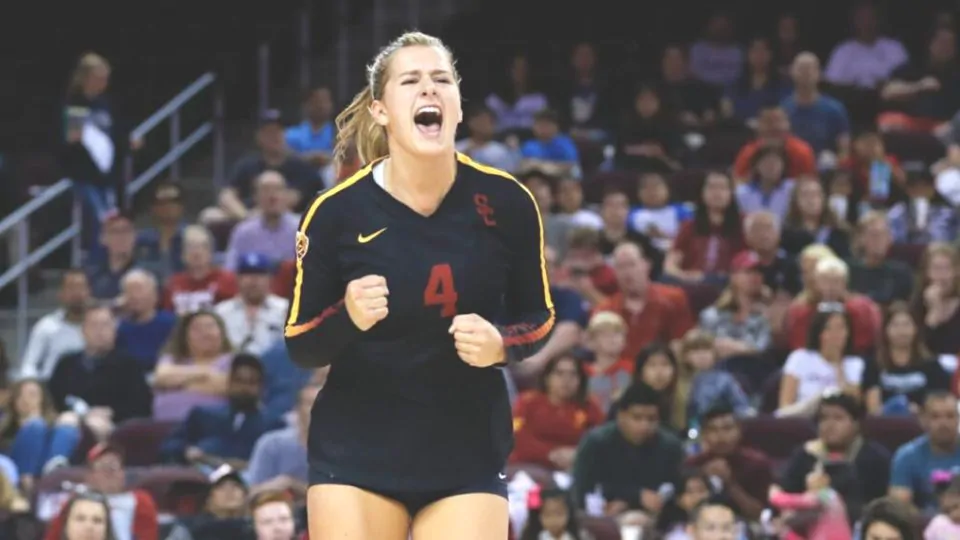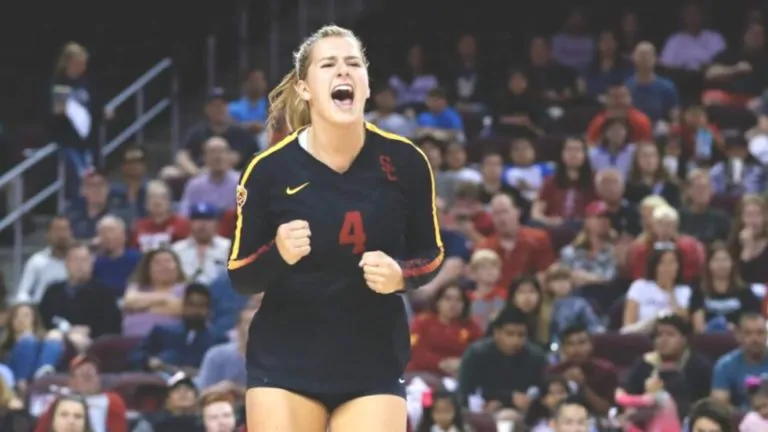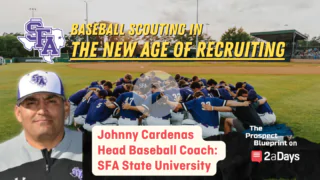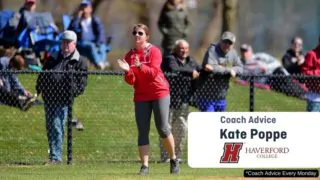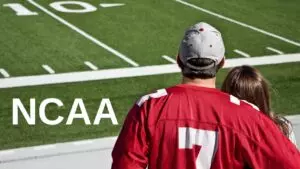Victoria Garrick was a walk-on volleyball player at the University of Southern California. She became a four-year starter and currently holds the record for the top five most digs in program history. She is a former Division I and a semi-professional athlete, and a mental health and body image advocate.
During Garrick's sophomore year of college, she delivered a TED talk on mental health and body image issues in student-athletes. She has been featured by outlets like Player's Tribune, USA Today College, and Popsugar magazine and has garnered more than 300,000 followers across social media platforms.
Victoria's informative podcast, Real Pod, discusses these issues with athletes, wellness professionals, and celebrities to prioritize and normalize their experiences. Victoria Garrick uses her own experiences as a high-level athlete to help educate others with similar issues. She is the founder of The Hidden Opponent, an advocacy group that addresses the stigma attached to athlete mental health.
This amazing young woman also travels the nation to speak to college athletes and athletic departments to help educate and inform them about the struggles that athletes face. She reminds college athletes around the country that they are not alone.
2aDays: What was one of the hardest or most frustrating moments in your recruiting process before you landed at USC?
I think the most difficult part of the recruiting process is probably having to invest a lot of time into reaching out and talking to coaches and grabbing their attention. Most of the time I wouldn't get a response back, because college coaches are so busy and there's so much going on. The most difficult thing for me was always being unsure of where I stood, what [a coach's] interest level was, and just being able to read the recruiter's side of things.
2aDays: Once you got to college, what was it like being a walk-on, and how did that title impact your own perceived identity?
So, I thought that it would really affect my identity on the team. I definitely thought, “will the girls treat me differently? Are they not going to respect me? Will they not include me? Are they just going to think I'm not good enough?” I was pleasantly surprised to be so welcomed, and so included—I was never treated differently. No one asked about who was on scholarship and who was not. The team did not treat me any differently—I was just one of their teammates.
However, I perceived my own identity differently because I knew I wasn't getting paid to play, which would affect me in terms of “well, why am I not getting paid to play? Is it because I'm not good enough?” So I would say it had more of an effect on how I perceived myself as to how others perceived me.
2aDays: Many high school and college athletes become overwhelmed by the pressure to perform, or to have the perfect game every game, whether it's because they are trying to get recruited or trying to get or keep a starting position. How can we prevent these feelings from becoming detrimental to both our mental states and our physical play?
When I was getting recruited, I thought, “Oh, I have to play perfectly. When they come to watch me, I have to pass amazingly, and I have to play amazingly.” And then you realize that coaches are looking at so much more in recruiting a player than if the ball goes where you want the ball to go. They're looking if you are athletic, if you make a mistake, how you bounce back from that mistake and if you are coachable.
Coaches know that you could see an athletic kid with a lot of potential in a small town where there's really only one team and not great coaching. So I think the biggest thing we can do is assure these high school athletes that coaches are looking at so much more than if they are a perfect player or not. Obviously, they want to see that you're good, but I think the things they want to see the most are: Do you have potential? Are you coachable? Are you athletic? Regardless of how good or perfect you are, you're going to come in, and they're going to teach you a whole new system and technique anyways. So, I think it's about a lot of things—not just playing perfect, and I wish I knew that when I was a high school athlete.
2aDays: What tips do you have for athletes who have lost their routine and identity due to the cancellation or postponement of sports during this time?
It's tough because not being a current member of any sort of team, I don't know the exact effects of what that must feel like. I would have to say that if this had happened for me, my guess would be that it would give me a unique sense of gratitude towards my sport. When I went back to sports, I could see myself feeling like it could be taken from me at any moment. The practices that felt like obligations, the games, the lifts, the workouts that I didn't want to go to, I would be dying to do that in quarantine.
It's an experience that was, yes, very traumatic, but something that I probably would have called on to find that gratitude and enjoyment of that sport as a college athlete when I was back playing. Once again, this has affected everyone differently, and I wish I could give better advice there, but it's not my personal experience. I think that I could imagine this in some ways sparking a new sense of joy for a lot of players who maybe didn't have as much joy before.
2aDays: What advice would you give to an athlete who is struggling with mental health but feels like they should just play through it?
I would ask them—would you play through a sprained ankle? Would you play through an ACL tear? And their answer would hopefully be no. We are only going to make the injury worse if we ignore it and play on something that's hurting. It can be tough for athletes to understand that a mental health issue or a mental illness is an injury.
It's just invisible, but that doesn't mean it's any less severe, and that doesn't mean you should play on it just because people don't know about it. I would tell them it needs to be treated just like a physical injury and it's only going to get worse if we ignore it. Part of being a great player is identifying a weakness, identifying what needs work, and spending time there. The same way I would say my jump shots off, or I'm really bad at kicks from half field—whatever the sport is—you have to identify the issue. Hey, I'm anxious when we are in overtime so I need to figure out why that's happening, I need to talk to someone about it, and I need to work on it. It's not just something that's going to magically get better.
Photo by Upworthy
2aDays: Many female athletes struggle with body image issues because we don't often resemble the super skinny body type that is glorified by mainstream and social media. How can female athletes learn to appreciate their bodies rather than resent them?
I always ask—who am I comparing myself to? Kendall Jenner? Who models for fashion week and could literally never hang in one practice on my team? And I think I'm supposed to look like her? I would think about the body type that we see on social media that's representative of this ideal figure and realize that it is not the body of someone who is training for a national championship—it's just not. So I had to realize it was more important to appreciate and value what my body was doing for me, as opposed to how my body appeared.
It just shifted my perspective and helped me accept that I would look differently. I look different from my high school self, and I look differently from Kendall Jenner. I think about how the body is a mechanism for performance and a part of why you are successful. I think we often separate ourselves from our bodies. We think we are just talking heads and our body is a thing that's like an accessory—we can cinch the waist, we need a bigger butt—like it's this thing we are stylizing and it's not. It's a part of you—your heart, your organs, the way you walk, the way you hug people—it's your body. Acknowledge it's a part of your success. That's what helped me.
2aDays: One in three female athletes are at risk for eating disorders. What are some of the healthy habits and behaviors that we can adopt within our teams to help encourage healthy and athletic relationships with food?
I feel like, within a team, it's imperative not to have our body image and food be part of the conversation. I don't need to know what you're eating, I don't need to know what you weigh this week—I don't want to know those things. That is between you and the team nutritionist or you and the strength and fitness coach. I don't need to know why you're not getting carbs at the team meal. I think just not talking about those things will make for an environment with less focus on food and body image, and it will simultaneously show us that those things are not the priority. How you look is not the priority—we talk about strategy, how hard we are working, and teams. We are not going to waste time talking about diets or what we don't like about ourselves.
2aDays: What are some initiatives that college athletic departments should take to prioritize the mental health of their student-athletes?
A good first step is to talk to your athletes and ask them, “what is the conversation around mental health like within our department? Do you feel like you can talk about it? Do you feel like we talk about it enough from an administrative side?”
First, I think open that door, and let the athletes speak and explain how they are feeling. From there, if you're in a room of caring people who are concerned and truly want the best for their student-athletes, I think you build on that and figure out the missing links and what's lacking and fix those things. It might be slow, and it might take time, but I think the best first thing to do is open that door and allow the student-athletes to voice how they feel.
2aDays: What was your favorite pump-up song to listen to before a game?
Levels by Avicii—that will get me hyped whatever the situation is. It also just makes me happy, so I think I just get, like, hyped and smile, and it brings me positive vibes where I'm thinking good things are going to happen in the future.
2aDays: What is the funniest or most embarrassing thing that has happened to you during a game or practice?
This one's brutal. I once was so anxious in the middle of a game that I was just thinking about how I was playing and how I wasn't playing. Coach called a timeout, and we went to the huddle, and I felt like the world was spinning a million miles per hour, and I couldn't even think or hear what the coach was saying. Then, the timeout ended, and I was so in my head that I just kind of walked back to the bench. The point starts, and there are five people on the court (you need six at all times), and I forgot that I was in the game. Division I, Pac-12, USC—and I forgot that I was in the game. At the time, I was mortified, but now it's just funny, and it just shows that when performance anxiety is really bad, it's wild what can happen.
* Originally published on July 6, 2020, by Stephanie O'Brien
